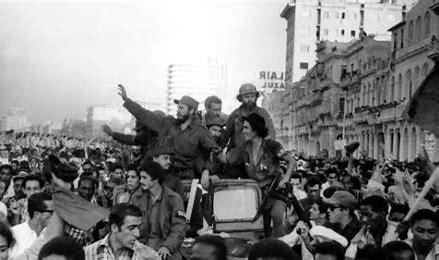
By Javier Herrera
HAVANA TIMES – On Tuesday, January 8, 1959, Fidel Castro entered Havana leading the “Caravan of Liberty,” which practically marked the beginning of the end of freedom in Cuba. A large group of poorly dressed men in olive-green military uniforms, armed and bearded, aboard jeeps and trucks, were hailed as heroes by an impassioned crowd.
Fidel Castro’s entrance into Havana marked the end of more than two years of a bloody civil war, where rebels attacked the regime through terrorist acts, selective assassinations, and military actions. The coup regime led by Fulgencio Batista responded with fierce repression, disregarding any human rights or the right to life.
The people, tired of the sad situation on the island, placed all their hopes in the victorious “26th of July Movement,” the official name of the insurgent group led by Fidel. The entry into Havana was impressive, with a sea of people flooding the streets to welcome the epic bearded figures laden with promises of peace and prosperity for the young republic that had seen its democratic path interrupted.
Fidel Castro, a populist and charismatic leader, told the people what they wanted to hear. With more promises than bullets in his backpack, Fidel addressed the people, sweetening their ears with promises of social redemption, peace, free universal education, free healthcare, democracy, and elections within 6 months… and I could spend hours recounting the promises that, for the most part, were not fulfilled or dissolved in future actions of the new regime imposed by Fidel himself.
On that January 8th, the people handed over the destiny of the country to the egomaniac who triumphed over the previous regime, and on that same day, the homeland began to be lost. In subsequent speeches, Fidel gradually betrayed each of his promises, but the people still trusted him, hopeful for a better life. Each social sector that the emerging regime believed could pose a threat to its hegemony was targeted.

Gradually, power accumulated in the hands of the new dictator until any freedom of expression, economic, social, democratic, political, or otherwise, was ultimately nullified. Fidel’s word became sacred, and with sharp and high-sounding rhetoric, he led the people into a system of terror and promises, to embrace socialism and international communism, ideologies foreign to Cuban political and economic thought.
Fidel Castro’s entry into Havana represented the end of a coup regime and the emergence of an even worse one that since has led the country into foreign wars, constant crises, large-scale emigration, uprooting, despair, and being a pariah people.
The heirs of the longest dictatorship in the Western Hemisphere now insist on celebrating their leader’s triumphant entry into the capital. Regardless of the social situation or the dire conditions in which the people exist, year after year, the dictatorship recalls the fateful event by organizing a parade with young members of the Communist Party of Cuba, the Union of Communist Youth, and a few surviving veterans, barely sustaining themselves with more medals than food.

This year was no exception, and the commemorative event saw the participation of the head of the Communist Party, President Miguel Díaz-Canel; the president of the Parliament and the Council of State, Esteban Lazo; the secretary of organization of the Central Committee of the Party, Roberto Morales Ojeda; the general secretary of the Federation of Cuban Women, Teresa Amarelle Boue; among other authorities of the Cuban Communist Party and veterans.

Without any shame, the current leaders of the oppressive regime that enslaves Cuba celebrate Fidel’s entry into Havana while the people endure the most severe economic crisis in decades, an unprecedented exodus, and desperation in the face of newly announced shock measures to try to recover the economy, including the rising costs of fuels, cooking gas, basic food items, transportation, and even labor force restructuring.
Meanwhile, the ordinary Cuban continues to wait for a miracle that never seems to happen, with withered hope, an empty stomach, without illusions, and what is worse, without a homeland because on a January 8th, it was lost by placing it in the hands of the infamous Fidel Castro.
Read more from Cuba here on Havana Times.




